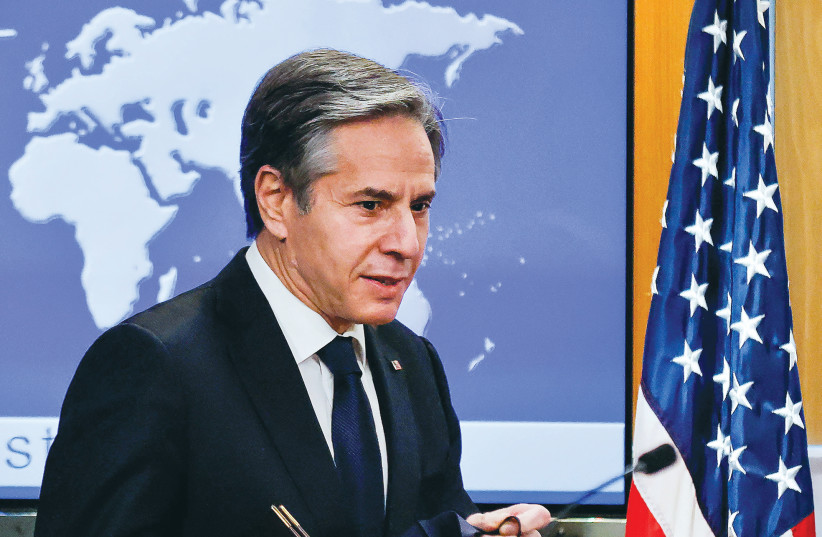Foreign Minister Eli Cohen has assured US Secretary of State Antony Blinken that the country’s judicial reform will not harm Israel’s status as a beacon of democracy in the Middle East, amid last week’s crisis in Israeli-US relations.
“Relations with the US are one of the pillars of Israeli foreign policy,” Cohen assured Blinken during their conversation late Thursday night.
“We will work in every way to strengthen the dialogue with our great friend, and I am happy that there is an open channel for dialogue between myself and Secretary of State Blinken.”
“Relations with the US are one of the pillars of Israeli foreign policy.”
Eli Cohen
“Israel is a beacon of democracy and stability. The long weeks of demonstrations prove that Israel has freedom of opinion, freedom of protest and freedom of the press,” he said.
Cohen emphasized that he was “proud” to be the foreign minister of a country that allowed the freedom to protest.

Israel-US tensions over judicial reform and Palestinians
The call took place just 48 hours after US President Joe Biden said he would not invite Prime Minister Benjamin Netanyahu to the White House in the near term and urged the Knesset to halt its fast-tracking of judicial legislation.
Netanyahu has said the reform plan will strengthen Israeli democracy, while critics have argued that it could transform Israel into a dictatorship.
Biden has urged Netanyahu to rely on a consensus judicial reform process that is based on dialogue with representatives of all sectors of society.
The read-out from the call provided by the State Department did not mention Blinken’s concern over the judicial overhaul.
Blinken “reaffirmed the importance of the enduring US-Israel bilateral relationship” and “discussed shared challenges, including Iran, as well as efforts to advance mutual interests, such as Israel’s further regional integration,” the State Department said after the call.
He said he welcomed Israel’s efforts to de-escalate tension with the Palestinians during the month of Ramadan, which ends on April 21, and overlaps with Passover and Easter.
He emphasized that the US remained committed to a two-state solution to the Israeli-Palestinian conflict and “welcomed recent efforts to de-escalate tensions between Israelis and Palestinians through meetings in Aqaba and Sharm el-Sheikh.”
Blinken also stressed “the importance of refraining from unilateral actions that exacerbate tensions.”
Cohen assured Blinken that Israel was committed to maintaining calm during Ramadan.
“I expressed my appreciation for the US’s important role as a stabilizing factor in the Middle East during this period. Israel is making a great effort to maintain the peace, and we are committed to the status quo and the freedom of worship in Jerusalem,” Cohen said.
He assured Blinken that Israel was committed to meeting the requirements to enter the US visa waiver program by the end of September.
He also discussed the importance of expanding the Abraham Accords, under whose auspices Israel normalized ties with four Arab nations in 2020 and 2021.
Both Cohen and Netanyahu have repeatedly spoken of the importance of normalizing ties with additional Arab countries.
“Expanding the circle of countries of peace is in the common interest of Israel and the US. I spoke with Secretary of State Blinken about joint activities to promote normalization with Arab and Muslim countries and the expansion of the Abraham Accords,” he said.
Cohen also tweeted about the call, a move he often does when holding important conversations. It appeared designed to underscore that high-level dialogue was occurring between Israel and its strongest ally, despite the tensions between the countries' leaders.
The messages that were expressed focused on the normative advancement of issues of common interest, despite the domestic turmoil.
Assistant Secretary of State for Near Eastern Affairs Barbara Leaf was less optimistic when she briefed reporters about her trip to the Middle East, which included participation in the Sharm el-Sheikh summit last week.
The US, she said, is “certainly keen on fostering the integration of Israel further and further into the neighborhood, into the region,” she said. This includes efforts to “deepen and broaden security integration so that our partners can collectively, in a multilateral sense, and with US support, defend against the multiplicity of threats whether from state actors or non-state actors,” Leaf explained.
She cautioned, “The complete distraction that was inevitable during this last week and last three months would also mean that there was a distraction [in Israel] away from the kind of urgent issues that need addressing in terms of the Palestinians, in terms of the West Bank, in terms of the issues that we have all been preoccupied with going into the holy month of Ramadan.
“Leaders from across the region have expressed their concern to me regularly over the last two months about the insecurity and instability in the West Bank and certainly the ability to deal with that, and the ability to deal with that was to some degree, not entirely, compromised by the issues related to public protest and the public disagreement over the judicial restructuring plan.”
Kevin McCarthy supports Netanyahu
In Washington, Speaker of the House Kevin McCarthy, who is a Republican, publicly threw his support behind Netanyahu, whom he called a “great friend of the United States.”
“Netanyahu is an Israeli patriot, statesman, and most importantly, a great friend of the USA,” McCarthy wrote in a tweet.
“Free societies have a vigorous and open debate. Israel is no exception,” he added.
“I support Netanyahu, and America’s support for Israel’s strong, vibrant democracy is unwavering,” McCarthy wrote.
Jerusalem Post Staff contributed to this report.
